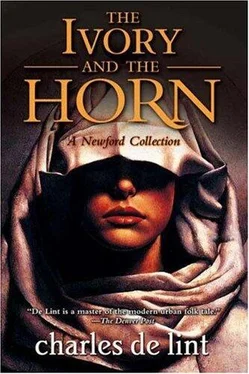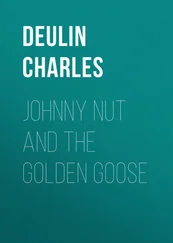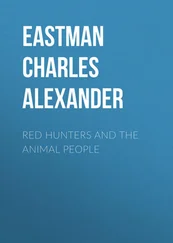Already the advice was fading. I found myself thinking, it was only a dream, There's no more wisdom in a dream than in anything you might make up. It's just shadows. Without substance.
I tried to tell myself that it wasn't true. I might make up my poems, but when they work, when the line of communication runs true between my heart and whoever's reading them, they touch a real truth.
But the argument didn't seem worth pursuing.
Above me, the sky was grey, overcast. The morning was cool and it probably wouldn't get much warmer. So much for summer. So much for my life. But it seemed so unfair.
I remembered the dream. I remembered Puck— my Puck, not Shakespeare's, not some actor, not somebody else's interpretation of him. I remembered the magic in his voice. The gentleness in his touch. The wild enchantment in his eyes. Somehow I managed, if only in a dream, to pull aside the curtain that separates strangeness from the world we've all agreed on, and find a piece of wonder that I could bring back with me. But now that I've woken, I find that all I've brought back is more of what it seems I've always had. Greyness. Boredom. No meaning in anything.
And that seemed the most unfair thing of all.
I lay back down on the grass and stared up into the Tree of Tales, my gaze veiled with tears. I could see the gloom that had spread throughout me during the summer, just deepening and deepening until it swallowed me whole. I was so sick of feeling sorry for myself, but I just couldn't seem to stop myself.
And then a small bird landed on a branch above my head— I don t even know what kind. A sparrow? A wren? It lifted up its head and warbled a few notes and for no good reason at all, I felt happy.
I didn't see the singer as a small drab brown bird on an equally drab branch, but as a microcosm that reflected every living thing. I didn't hear its song as a few warbled notes, quickly swallowed by the sounds of traffic beyond the confines of the park, but as an echo of all the music that was ever sung.
I sat up and looked around and nothing seemed the same. It was as though someone had just told me some unbelievably good news and simply by hearing it, my perspective on everything was changed.
7
Someone once described the theory of right and left brain to me and I read up on it myself later. Basically, it boils down to this: The left brain is the logical one, the rationalist, the scientist, the one that sees us through the everyday. It's the one that lets us conduct normal business, walk safely across a busy street, that, kind of thing. And it's the one we know best.
The right brain belongs to the artist and its mostly a stranger because we don't call on it very often. In the general course of our lives, we don't need to. But fey though it is, this stranger inside us is the one that keeps us sane. It's the one that imparts meaning to what we do, that allows us to see beyond the drone of the everyday.
It's always trying to remind us of its existence. It's the one that's responsible for synchronicities and other small wonders, strange dreams or really seeing a small drab brown bird. It'll do anything to shake us up. But mostly we don't pay attention to it. And when we sink low enough, we don't hear its voice at all.
And that's such a shame, because that stranger is the Puck in the midden, the part of us that makes gold out of trash, poetry out of nonsense. It calls art forth from common sights and music from ordinary sound and without it, the world would be a very grey place indeed. Trust me, I know— from my own all-too-unpleasant experience with that world. But I'm working on never going through a summer like that again.
The stranger, that Puck in my midden, showed me how.
When I think of that Puck now, I'm always reminded of how he came to me— not just from out of a dream, but from a dream that was based on someone else's dream, put to words, enacted on the stage, centuries after his death. And l believe now that Shakespeare did write the plays that bear his name.
I doubt we'll ever know for sure. In this case, the historical version's lost, while the stories everybody else has to tell contradict one another— as so often they do. But I'll pick from between the lines and say it was old Will.
Because the dream also reminds me of the Tree of Tales, and I think maybe that's what Shakespeare was: a kind of human Tree of Tales. He got told all these stories and then he reshaped them into his plays so that they wouldn't be forgotten.
It doesn't matter where he got those stories. What matters is that he was able to put them into the forms they have now so that they could and can live on: small sparks of wisdom and joy, drama and buffoonery, that touch the stranger inside us so that she'll remind us what we're all here for. Not just to plod through life, but to celebrate it.
But knowing all of that, believing in it as I do, the mystery of authorship still remains for most people, I suppose. The scholars and historians. But that's their problem; I've solved it to my own satisfaction. There's only one thing I'd ask old Will if I ever ran into him. I'd love to know who told him about Puck.
I'll bet she had a tempest in her eyes.
Saxophone Joe And The Woman in Black
A cat has nine lives. For three he
plays, for three he strays, and for
the last three he stays.
— American folklore
I love this city.
Even now, with things getting worse the way they do: Too many people hungry, or cold, or got nowhere to sleep, and here's winter creeping up on us, earlier each year, and staying later. The warm grate doesn't do much when the sleet's coming down, giving everything the picture-perfect prettiness of a fairy tale— just saying you've got the wherewithal to admire a thing like that, instead of always worrying how the ends are going to meet.
But you've got to take the time, once in a while, or what've you got? Don't be waiting for the lotto to come in when you can't even afford the price of a ticket.
It's like all those stories that quilt the streets, untidy little threads of yarn that get pulled together into gossiping skeins, one from here, one from there, until what you've got in your hand isn't a book, maybe, doesn't have a real beginning or end, but it tells you something. You can read the big splashes that make their way onto the front page, headlines standing out one inch tall, just screaming for your attention. Sure, they're interesting, but what interests me more-is the little stories. Nothing so exciting, maybe, about losing a job, or looking for one. Falling in or out of love. New baby coming. Old grandad passed away. Unless the story belongs to you. Then it fills your world, and you don't have time even to glance at those headlines.
What gets me is how everybody's looking to make sense of things. Sometimes you don't want sense. Sometimes, the last thing in the world you need is sense. Work a thing through till it makes sense and you lose all the possibilities.
That's what runs this city. All those possibilities. It's like the heart of the city is this old coal furnace, just smoking away under the streets, stoked with all those might-yet-bes and who'd-a-thoughts. The rich man waking up broke and he never saw it coming. The girl who figures she's so ugly she won't look in a mirror, and she finds she's got two boys fighting over her. The father who surprises himself when he finds he likes his son better, now that he knows the boy's gay.
And the thing is, the account doesn't end there. One possibility just leads straight up to the next, with handfuls of story lying in between. Stoking the furnace. Keeping the city interesting.
You just got to know where to look. You just got to know how to look.
Читать дальше












